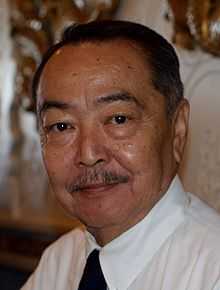Richard Aoki
| Richard Aoki | |
|---|---|
 | |
| Born |
November 20, 1938 San Leandro, California, United States |
| Died |
March 15, 2009 (aged 70) Berkeley, California, United States |
Cause of death | Self-inflicted gunshot wound |
| Education | Merritt College; University of California, Berkeley |
| Occupation | Civil Rights activist most known for his role in the Black Panther Party |
Richard Aoki (/ɑːˈoʊki/ or /eɪˈoʊki/; November 20, 1938 – March 15, 2009) was an American educator and college counselor, best known as a civil rights activist and early member of the Black Panther Party. He joined the early Black Panther Party and was eventually promoted to the position of Field Marshal. Although there were several Asian Americans in the Black Panther Party, Aoki was the only one to have a formal leadership position.[1][2] FBI records released in 2012 document Aoki's work as an FBI informant from 1961 to 1977.
Life
Aoki was born in San Leandro, California in 1938 to Japanese parents. He and his family were interned at the Topaz War Relocation Center in Utah from 1942 to 1945. They moved to Oakland, California after World War II ended. Aoki spent eight years serving in the United States Army, first as a medic and later in the infantry. He attended Merritt College for two years, where he became close friends with his longtime acquaintances Huey Newton and Bobby Seale, the founding members of the Black Panther Party; the organization was founded in October 1966, one month after Aoki transferred to the University of California, Berkeley. He graduated with a bachelor's degree in sociology in 1968 and a Master of Social Work degree in 1970.[3]
It was originally reported that Aoki died at his home in Berkeley from complications from dialysis.[4] Nearly a year later, it was publicly revealed that he had died of suicide from a self-inflicted gunshot wound. His life was chronicled in the 2009 documentary film, Aoki.[5]
Work as FBI informant
In 2012, Center for Investigative Reporting journalist Seth Rosenfeld reported that Aoki was an FBI informant who had infiltrated chapters of the Communist Party, the Socialist Workers' Party and, nearly from its inception, the Black Panther Party.[6] The FBI gave Aoki the informant code number "T-2", and the code name "Richard Ford." FBI agent Burney Threadgill Jr. said that Aoki "[...] was my informant. I developed him."[7]
Aoki's 221-page FBI informant file documents sixteen years of cooperation between Aoki and the FBI's San Francisco office, from the late 1950s into the 1970s. The records show "that at various points, he provided information that was 'unique' and of 'extreme value.'"[8] Working for the FBI, Aoki provided the Black Panthers with some of their first guns and weapons training.[9]
Footnotes
- ↑ "Another shade of Black Panther...". It's About Time. Retrieved 2009-06-07.
- ↑ Neela Banerjee (2001-04-27). "Back in the Day...". AsianWeek. Retrieved 2009-06-07.
- ↑ View archival newsfilm from KRON-TV, featuring Aoki speaking at UC Berkeley in March 1969: https://diva.sfsu.edu/collections/sfbatv/bundles/208092.
- ↑ Momo Chang (2009-03-18). "Richard Aoki, charter member of Black Panthers, dies in Berkeley". San Jose Mercury News. Retrieved 2009-06-07.
- ↑ Puck Lo (2009-11-12). "Film on former Panther Richard Aoki debuts". Oakland North. Retrieved 2010-02-19.
- ↑ Seth Rosenfeld (August 20, 2012). "Activist Richard Aoki named as informant". San Francisco Chronicle.
- ↑ Seth Rosenfeld, Center for Investigative Reporting (2012-08-20). "Activist Richard Aoki named as informant". San Francisco Chronicle. Retrieved 2013-06-15.
- ↑ Sep 07, 2012 (2012-09-07). "FBI files reveal new details about informant who armed Black Panthers |". The Center for Investigative Reporting. Retrieved 2013-06-15.
- ↑ Bobby Seale, A Lonely Rage - The Autobiography of Bobby Seale, 1978. ISBN 0-8129-0715-9
Further reading
- Diane C. Fujino, Samurai Among Panthers: Richard Aoki on Race, Resistance, and a Paradoxical Life. Minneapolis, MN: University of Minnesota Press, 2012.
External links
- Official website for Aoki, A Film Documentary (includes video clips from film)
- Was Bay Area Radical, Black Panther Arms Supplier Richard Aoki An Informant for the FBI? from Democracy Now! 23 August 2012
- Richard Aoki's FBI files, hosted at the Internet Archive
| ||||||||||||||||||||||||||||||
|